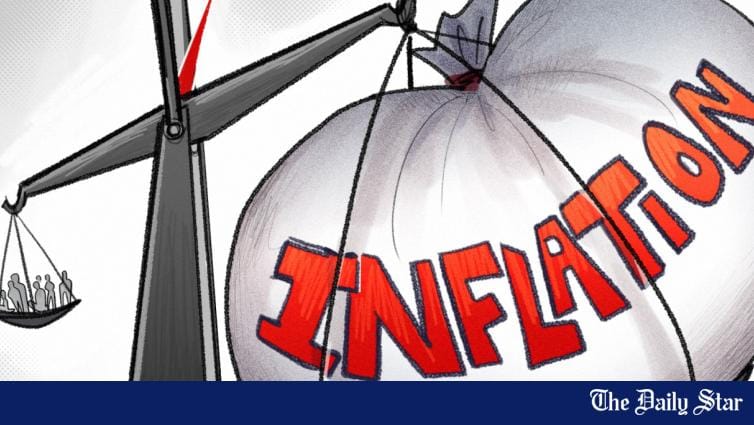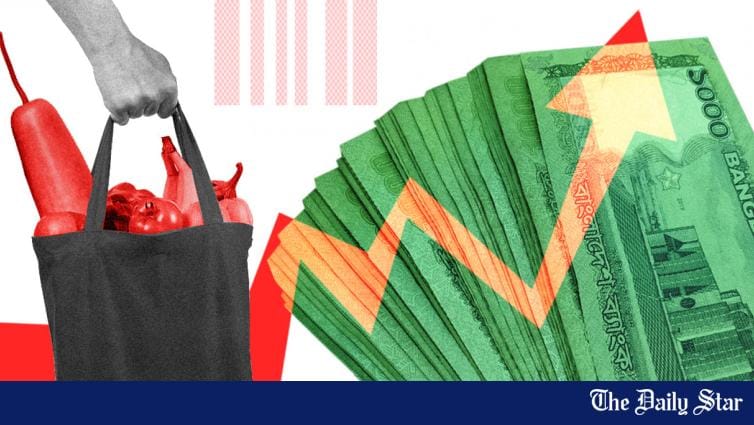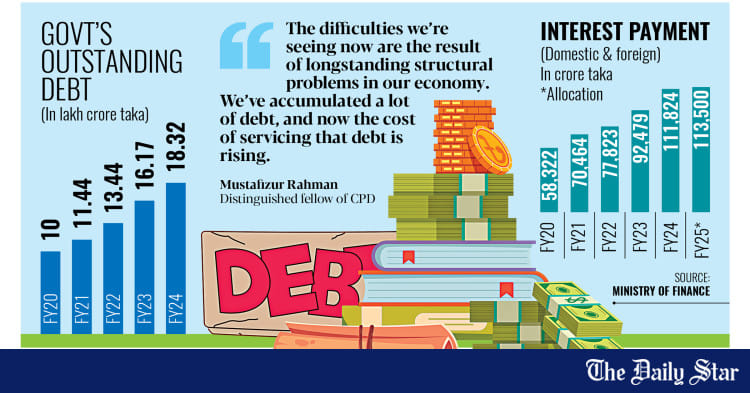Saif
Senior Member
- Joined
- Jan 24, 2024
- Messages
- 17,262
- Likes
- 8,334
- Nation

- Residence

- Axis Group


Dilemmas foreshadow budget making for funding holdback
Finance officials seem in dilemmas crafting the upcoming fiscal budget with uncertainty overshadowing budget-support credits worth some billion dollars from foreign development financiers, as IMF lending stays in holdback. Officials say initially they had planned to enhance net foreign borrowings
Budget-support credit worth $3.0b looks uncertain
Dilemmas foreshadow budget making for funding holdback
IMF naysay may echo thru other development partners
Syful Islam
Published :
May 10, 2025 00:17
Updated :
May 10, 2025 00:17

Finance officials seem in dilemmas crafting the upcoming fiscal budget with uncertainty overshadowing budget-support credits worth some billion dollars from foreign development financiers, as IMF lending stays in holdback.
Officials say initially they had planned to enhance net foreign borrowings for financing the 2025-26 budget compared to the current budget. Some US$3.0 billion in budget support from the pipeline was expected be available soon, amid an indication that in the next fiscal year the country also may get a significant amount as budget support from the development partners.
However, with the International Monetary Fund (IMF) showing restraint from releasing fourth and fifth tranches of a $4.7-billion lending programme, amounting to some $1.3 billion, Finance Division officials are now not certain whether or not the other development partners will extend their budget support.
"We are now not confident about getting the IMF's budget-support loan as the differences are not narrowing," a senior finance ministry official told the FE, as long-drawn negotiations ended sans deals.
If the IMF does not agree to release the tranches, he feels, the other development partners also may turn their back to Bangladesh. The bilateral and multilateral development partners usually follow IMF assessment before extending any financial support to any country.
According to the finance officials, presently, apart from IMF's $1.3 billion, there is a sum of $500 million from the World Bank, $500 million from the Asian Development Bank, 400 million from the Asian Infrastructure Investment Bank (AIIB), and $250 million from Japan International Cooperation Agency (JICA) as budget support in the pipeline.
In the current fiscal budget, the net foreign-borrowing target was set at Tk 907 billion which the budget officials had planned to enhance to Tk 1.0 trillion in the upcoming budget, sources said.
On the contrary, the budget officials were planning to lower borrowing from domestic sources to Tk 1.4 trillion in the next fiscal year from Tk 1.609 trillion in the outgoing one to help higher fund flow for private-sector investment.
However, with the changed financial scenario, officials involved in budget preparation are now in a quandary as to how to finance the next budget without harming private-sector investment if budget-support loans are not given by the development partners in the few days left before the new budget rollout.
On return from the spring meetings of the IMF and the World Bank late April, Finance Adviser of the interim government Dr Salehuddin Ahmed said: "IMF doesn't agree to pay the budget-support credit, we will prepare budget on our own."
The government has already decided to trim the size of coming budget compared to the current one taking into consideration the trend of financing from home and abroad.
Dr Zahid Hussain, a former lead economist at the World Bank's Dhaka office, says unless the government gets budget credits amounting to some $3.0 billion from the development partners, they will have to cut expenditure by any means or enhance revenue collection.
He thinks achieving the big revenue-earning target the government is setting for next fiscal year will be "largely impossible".
Also, Mr Hussain foretells, unless budget-support credit is available, the government will have to depend on project aid which is only available based on project implementation.
"In that case, the government will have to depend on financing from domestic sources that means banking sector only to dry-out funds for private-sector investments," he told The Financial Express.
Mr Hussain feels this was the high time the government made the exchange rate fully market- dependent.
He mentions that the governor has recently been saying that forex supply was very good, demand was not strong, current-account balance was in positive territory, and everything was stable.
The economist also points out that dollar price has gone three years down on the international market while crude oil, gas, and coal prices have fallen, and commodity price is projected to tumble by 12 per cent in 2025.
"Thus, there is no chance of exchange-rate volatility if the control is lifted," he says, adding, "As everything is stable, the government should have taken the chance and met the IMF's requirement."
Dilemmas foreshadow budget making for funding holdback
IMF naysay may echo thru other development partners
Syful Islam
Published :
May 10, 2025 00:17
Updated :
May 10, 2025 00:17
Finance officials seem in dilemmas crafting the upcoming fiscal budget with uncertainty overshadowing budget-support credits worth some billion dollars from foreign development financiers, as IMF lending stays in holdback.
Officials say initially they had planned to enhance net foreign borrowings for financing the 2025-26 budget compared to the current budget. Some US$3.0 billion in budget support from the pipeline was expected be available soon, amid an indication that in the next fiscal year the country also may get a significant amount as budget support from the development partners.
However, with the International Monetary Fund (IMF) showing restraint from releasing fourth and fifth tranches of a $4.7-billion lending programme, amounting to some $1.3 billion, Finance Division officials are now not certain whether or not the other development partners will extend their budget support.
"We are now not confident about getting the IMF's budget-support loan as the differences are not narrowing," a senior finance ministry official told the FE, as long-drawn negotiations ended sans deals.
If the IMF does not agree to release the tranches, he feels, the other development partners also may turn their back to Bangladesh. The bilateral and multilateral development partners usually follow IMF assessment before extending any financial support to any country.
According to the finance officials, presently, apart from IMF's $1.3 billion, there is a sum of $500 million from the World Bank, $500 million from the Asian Development Bank, 400 million from the Asian Infrastructure Investment Bank (AIIB), and $250 million from Japan International Cooperation Agency (JICA) as budget support in the pipeline.
In the current fiscal budget, the net foreign-borrowing target was set at Tk 907 billion which the budget officials had planned to enhance to Tk 1.0 trillion in the upcoming budget, sources said.
On the contrary, the budget officials were planning to lower borrowing from domestic sources to Tk 1.4 trillion in the next fiscal year from Tk 1.609 trillion in the outgoing one to help higher fund flow for private-sector investment.
However, with the changed financial scenario, officials involved in budget preparation are now in a quandary as to how to finance the next budget without harming private-sector investment if budget-support loans are not given by the development partners in the few days left before the new budget rollout.
On return from the spring meetings of the IMF and the World Bank late April, Finance Adviser of the interim government Dr Salehuddin Ahmed said: "IMF doesn't agree to pay the budget-support credit, we will prepare budget on our own."
The government has already decided to trim the size of coming budget compared to the current one taking into consideration the trend of financing from home and abroad.
Dr Zahid Hussain, a former lead economist at the World Bank's Dhaka office, says unless the government gets budget credits amounting to some $3.0 billion from the development partners, they will have to cut expenditure by any means or enhance revenue collection.
He thinks achieving the big revenue-earning target the government is setting for next fiscal year will be "largely impossible".
Also, Mr Hussain foretells, unless budget-support credit is available, the government will have to depend on project aid which is only available based on project implementation.
"In that case, the government will have to depend on financing from domestic sources that means banking sector only to dry-out funds for private-sector investments," he told The Financial Express.
Mr Hussain feels this was the high time the government made the exchange rate fully market- dependent.
He mentions that the governor has recently been saying that forex supply was very good, demand was not strong, current-account balance was in positive territory, and everything was stable.
The economist also points out that dollar price has gone three years down on the international market while crude oil, gas, and coal prices have fallen, and commodity price is projected to tumble by 12 per cent in 2025.
"Thus, there is no chance of exchange-rate volatility if the control is lifted," he says, adding, "As everything is stable, the government should have taken the chance and met the IMF's requirement."









































